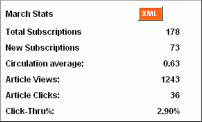RSS is not likely to replace email anytime soon. But it has tremendous potential from a marketing perspective. Every marketing professional needs to be aware of what RSS can do.
Before RSS becomes more widely adopted, though, two things will have to change.
First, we have to get rid of the technical lingo obfuscating RSS. For instance, if you are trying to entice newbies to try a feed, you can't do it very well through a link that says "Syndicate this site." I remember how baffled I was when I first encountered that phrase. Why, I thought, would I want to syndicate someone's site? What exactly was I being expected to do by "syndicating" someone's site? What was in it for me?
RSS adoption will move faster once we all learn to use language that conveys the benefits of RSS to the user.
Second, we need to broaden our understanding of what RSS can be used for. RSS is about much more than getting burned-out trying to consume super-human volumes of RSS feeds through feedreaders. (Maybe Robert Scoble can read 500 feeds a day -- more power to you, Robert -- but that's not how I plan to spend my limited time on this earth.) I personally find reading content through today's aggregators a marginal attraction.
Yes, I use aggregators -- every day. I use them for my business research and to see what's new on my favorite blog sites. I use the online services, especially Bloglines, which in my opinion is the best of them.
The biggest benefit that I get out of the RSS online services is actually their search engines and alerts. I go to Bloglines to find out who is linking to my site and for research purposes. Same goes for Technorati.
But to do my reading, I much prefer to visit individual sites themselves. Dry strings of text one after another in a feedreader window don't do a thing for me. I like to see content the way the writer wanted it presented. Visiting the site is part of the entire user experience.
The real business benefit of RSS will come when more large corporations and small businesses discover how to leverage RSS for marketing and business communications purposes. RSS can be used to push out information about press releases, product announcements, company news, newsletters and other communications. It even can be used to display news from one site on another site.
Recently I've been trying out some new RSS tools. The ones I like to explore are marketing and PR tools. Marketing and PR -- that's where the exciting stuff is happening. Here are two tools I am finding useful:
- Syndicate IQ: This service tracks the number of subscribers to my various feeds. It tells me how many readers have subscribed to my feeds, how many are actually looking at my content, when they look at it, and lots of other detailed information.

The statistics I am showing here to the right are just a few of the many statistics it gives me. Those who are familiar with email marketing services that track reader statistics will understand the value of Syndicate IQ. - Nooked: Nooked provides a hosted service to allow you to create RSS feeds easily for a Web page -- separate and apart from a blog page. That's valuable, since not every business communication fits neatly into blog posts. And I think Nooked's new directory for corporate RSS feeds is a brilliant idea. If you have a corporate RSS feed, I urge you to go over and submit it to Nooked's directory.
No comments:
Post a Comment